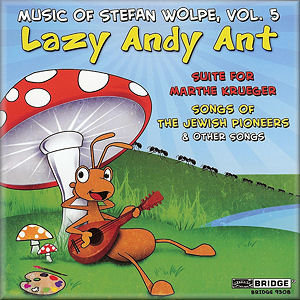 |
 |
|


alternatively
CD: AmazonUK
AmazonUS
|
Stefan WOLPE (1902-1972)
The Music of Stefan Wolpe - Volume 5
Lazy Andy Ant (1947) (Text by Helen Fletcher) [18:08]
Patrick Mason (narrator); Zac Garcia (Andy)
Wendy Buzby (The Judge); Mathew Whitmore (The Anteater)
Quattro Mani (Susan Grace and Alice Rybak), (pianos)
Suite for Marthe Krueger (1940) [22:01]
Quattro Mani (Alice Rybak & Susan Grace, pianos)
The Angel (1959) [2:26]
Rebecca Jo Loeb, (mezzo-soprano); Ursula Oppens, (piano)
Two Songs for Baritone (1938) [3:10]
I. Die Reichen (Heslova)
II. An Dich (Whitman)
O Captain (1946) [4:01]
Matt Boehler (bass-baritone); Ursula Oppens (piano)
Songs of the Jewish Pioneers (1938) [5:05]
Ra'inu; Saleinu; Tel Aviv; Holem Tza'adi
Rebecca Jo Loeb (mezzo-soprano); Ursula Oppens (piano)
To a Theatre New (1961) [2:21]
 Matt Boehler (bass-baritone); Ursula Oppens (piano)
Matt Boehler (bass-baritone); Ursula Oppens (piano)
rec. December 2007, Hamilton Recital Hall, Lamont School of Music,
Denver (Lazy
Andy Ant); October 2007, Packard Recital Hall, Colorado College,
Colorado (Suite); March and May 2008 Performing Arts Centre Recital
Hall, SUNY College, Purchase, NY
 BRIDGE 9308 [58:07]
BRIDGE 9308 [58:07] 
|
|
|
Bridge’s dedication to Stefan Wolpe is admirable, but one wonders
just how big a constituency there can possibly be for a disc of
this kind. Its programme is necessarily varied; a selection of
songs, a suite for two pianos for a ballet performance, and the
title track, as it were, with the Tubby the Tuba-like title of
Lazy Andy Ant which is puffed up in the notes as an allegorical
study worthy almost of Miltonic stature.
The text was written by Jill Fletcher to be declaimed by a single
narrator with two pianos. Here it’s parcelled out to a troupe
of actors, to better aggrandise the narrative I suppose, but its
modest forces would be served just as well, if not more realistically,
by that one narrative voice. It was probably intended as the music
for a puppet theatre show. It’s not really susceptible of too
much analysis. There are amusing and droll moments; the entrance
of the Queen Ant, mandolin impressions, the Broadway-like song
to the Judge (Andy’s Song), the doughty, scary music for the Anteater.
As one can tell, going over the plot is not advisable. There is
some ‘production’ here in the performance to turn it into a more
vital listening experience but less is probably more. It’s apparently
‘a parable of the heroic artist, scorned, pilloried, and exiled...’
etc, etc.
None of his songs have lodged in my brain, despite copious re-hearings.
There’s a very busy piano part for the Blake song but Wolpe’s
writing is unmemorable. The 1938 Two Songs for Baritone include
a measured setting of Whitman, though again there’s a sense of
diffuseness to the writing. O Captain!, the other Whitman
setting of 1946 should be outstanding but it stubbornly refuses
to engage. The Jewish Pioneer songs are brief and not unattractive,
mixing Middle Eastern and more obviously cosmopolitan influences.
The other big work here though is the Suite for Marthe Krueger
(1940). It’s a dance suite and was split up into three sections
at the premiere, not played straight through. It’s diatonic, strongly
argued, urgent, tense and sinewy. There are Bachian undercurrents
but the heavy-booted and busy writing remains over-extended and
fitfully challenging. Twenty two minutes was more than enough.
Sorry to be negative. The performances sound excellently prepared
and realised. Ursula Oppens is one of the pianists. The booklet
gives us requisite texts and backgrounds.
Jonathan Woolf
|
|












